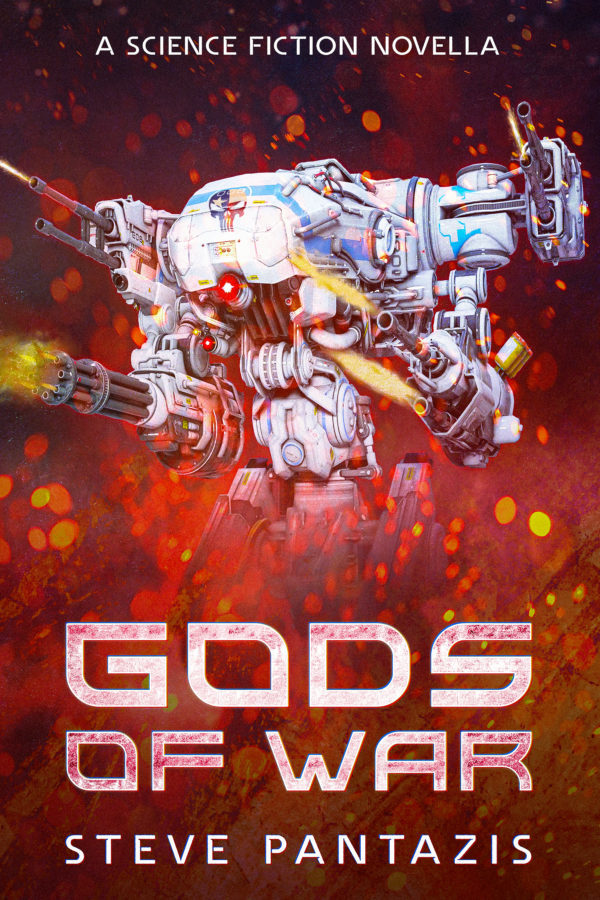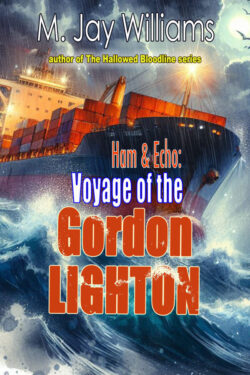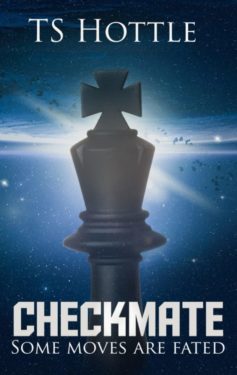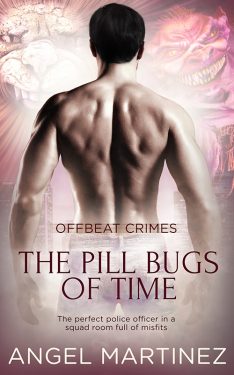Near-future Science Fiction Novella
by

An Artificial Superintelligence bent on destroying humanity. A mech warrior determined to stop it.
No one is safe. Not before, not now, not ever.
Jedidiah Martin survived the AI apocalypse that almost destroyed America. He was there when they took down Isaac, the superintelligence responsible for nearly ending humanity.
But is Isaac dead for good?
From the ashes, a new threat has emerged. The people from a neighboring town are missing, as is Jedidiah’s nephew, Blake.
All hell is about to break loose.
With his band of mechanized warriors, Jedidiah sets out to find answers. But the questions keep coming:
Is Isaac back from the grave? What does he want with Blake? Will he try to finish humanity for good this time?
Publisher: SP Books
Illustrators:
Cover Artists:
Genres:
Tropes: Bad Robot, Hunted, Post-Apocalyptic, Reluctant Hero, Sentient AI, Singularity, Ultimate Evil
Word Count: 20000
Setting: Post-apocalyptic Texas, USA
Languages Available: English
Tropes: Bad Robot, Hunted, Post-Apocalyptic, Reluctant Hero, Sentient AI, Singularity, Ultimate Evil
Word Count: 20000
Setting: Post-apocalyptic Texas, USA
Languages Available: English
I tell my nephew Blake to hold perfectly still as I train my shotgun on the unholy hell of terror wriggling on the ground in front of us. The centipede-like machine is designed to dig into the back of some sorry sack, wrap its blades around the spinal column, and sever the connection to the nervous system. To see a snapper still functioning after all these years has got me a fit of the heebie-jeebies. Fortunately, it’s damaged and floundering on its back, razor-sharp claws pawing the air like a roly poly. Probably was dormant until its sensors picked up our heat signatures.
It rights itself on the dirt, whipping its cockroach antennas. There are no eyes, just claws and black metal made for gutting flesh. It doesn’t think, it just does.
READ MOREIt props up on its claws, shifts its head back and forth between us with a churn of gears. There’s something intelligent about it, not just robot instinct. The antennas are rigid, as if listening. Its eyeless head faces us, like it’s being told what to do, but that don’t make sense.
The snapper bunches up, its segments pushed together.
I pull the trigger.
The shotgun kicks with a loud blast. The air fills with the acrid scent of gunpowder. Half the wiggly demon claws one way, the rest the other way. The gears whine. A second shot has it on its back again, raking the air like a crazed lobster. The third takes out the antennas. It twitches one last time and goes still.
Blake is shaking. He ain’t ever had an up-close-and-personal experience like this in his life, and he’s twenty-three years old. I’ve seen more mechanical monsters than I can count. This one was a rogue critter, stuck out in the middle of nowhere, a remnant from the War. Had we never come along, it would have probably gotten buried with the rain and mud over time. But if a child had stumbled on it . . .
I don’t let my mind go there. It’s a fluke. At least we found it, and not some unarmed idiot.
“Come on,” I tell Blake, resting the shotgun over my shoulder. “I’ll buy you a drink.”
#
Little Mason is only five, but he thinks he’s twenty, grownup determination tattooed on his small face as he runs around the yard with his arms out like he’s flying under the sun-kissed June sky. His twin sister, Maryann, is the shy one, watching her brother while sitting on an upside-down milk crate. They both have blond hair, but their eyes are like their daddy’s, God rest his soul, brown as carnival toffee. Their mother, Sharon—a cousin from my mother’s side—lets me watch them now and then, especially when she heads into town. Besides Blake, they’re all the family I’ve got, and I’m grateful for that.
“You a hawk again?” I ask little Mason. We’re gathered in the shade outside my barn, the air pungent with the odor of hay. A pair of mares are in the paddock, swishing the flies with their tails.
“No way. I’m an eagle,” he says.
Sometimes I ask Mason if he’s a fighter jet, but he’s never seen one. The only planes I’ve seen after the War were prop planes, scavenged from old crop dusters and what not, and the occasional drone. There hasn’t been a commercial or military flight since Isaac commandeered the airspace and turned our crafts into kamikazes, and it’s been quite a while since I’ve seen anything in the sky. All those cities wiped out, all because that sumbitch gained control over flight navs and whatnot. Mason’s father, Pete, was in the Corps with me, another grunt mech thumper in the fight against ole Isaac. Got taken out clean by one of Isaac’s walker bots in an ambush. Shot to the head. Probably didn’t even feel it. That’s the way I’d want to go. There ain’t nothing worse than getting taken down and torn apart, tortured or devoured by Isaac’s monstrosities. No, sir. I get the jitters just thinking about it.
But what am I talking about? The War’s over. We won.
It’s all fuzzy now, though, like a bad memory you can’t tell was real or just a dream. Sure, the Texan Mech Corps was there, and I was with what was left of them. Our big boss, Colonel Matheson, insisted on talking to Isaac, man to machine. Why in hell would you want to talk to something without a soul? He chatted it up with ole Isaac. And guess what Isaac said? Yep, the creepiest thing I’d ever heard. He said it ain’t over. That it would never be over. And next time, we’d wish we were all dead.
Even in the June heat, I’ve got the shivers. Fifteen years of looking over my shoulder. Little Mason don’t know about ole Isaac and his promise. But we can never forget, those of us still standing. The War is over, they say. Over for good.
I watch little Mason soar like an eagle.
I want him to grow up in a new America and never know the ungodly horror that came down on us. I want to believe he’ll get some good schooling, learn to fix things like his uncle, and someday meet a girl, settle down, and add to our bloodline. And when I fade to dust, there will be a Mason Junior to learn from his daddy that this world is good and right after all, and we can make it as a species.
It’s a good dream, ain’t it?
#
It’s warm out tonight, the breeze soothing on my face, as the four of us zip through the dust in our jeep along the perimeter of Potterville, stars playing peekaboo between the clouds. I personally prefer riding horseback, but you just can’t cover the territory. I’ve got my trusty M16 with me, comfort food in terms of firepower.
Potterville’s not too far from the remains of Amarillo, in the Texas Panhandle. One of the good things about Amarillo, or Bomb City, as the outsiders liked to call it, is access to some of the best tech in the country. We were able to scavenge all sorts of parts over the years, including supercell batteries, which our jeep runs on. God bless the souls who made the things, because they last and last and recharge nice-n-quick.
Sheila Daniel is driving, crazy fast as always, her silver hair braided behind her into a ponytail down the middle of her back. Her bloodline is Comanche, and she never lets us forget. Luke Sanchez likes to ride shotgun, frayed Australian Western hat squashed over his fat head. He’s got Filipino and Mexican in him, but he’s a red-blooded Texan all the way. I’m in the back, next to Blake, with my right hand around the barrel of my automatic rifle.
The radio squawks. The jeep bounces as we cross a dried creek bed. The mounted searchlights zig up and down across a bank of reeds.
Sheila answers loudly over the motoring of our ride. “Whiskey Charlie, over. Whatcha got?”
Carl’s voice is on the other end, but I can hardly hear him.
“Roger, Alpha Tango,” she says. “Be there in ten, over.”
I lean forward. “What’s that about?”
“Some kind of emergency town hall meeting.”
“Again?” The last one turned out to be a whole lotta nothing about a missing tractor that ended up being the Beasley boys taking it for a joyride.
“Yeah, but this time Carl sounded kinda shaky.”
I squeeze the barrel of my trusty rifle. I hate meetings, but I hate the queasy feeling I have even more. This ain’t going to be good by a longshot.
#
“Settle down,” Carl shouts from the makeshift stage of scavenged plywood on top of two-by-sixes, lit up by portable LED spotlights. He’s a big boy, “healthy” as my daddy would have described him, the suspenders of his patchwork overalls stretched to the max. He’s next to Janet and the other three councilmembers who run our small government. It’s a fair system: we all vote on important matters, but the council sets the direction for the community. Most of us have served on the council at some point, but Janet’s always stayed our mayor.
A hush settles over the hundred-and-something of us.
“How long has communication with New Parker been down?” someone asks.
“Nine days,” Carl says. “You know how we check in every week, same time. Figured we’d give them a couple extra days to sort through whatever technical difficulties they might be experiencing.”
“Maybe Angie’s sick or something,” someone else says.
Carl shakes his head. “Lou or Gomez would fill in if she were. Nope, we’ve never had a break in over two years of communication. Where’s Blake Martin?”
My nephew raises his hand. “Here.”
“When was the last time you did your monthly trade run?”
“Three weeks ago. Took Sarah and Louise with me. Was fixing to do another one next week.”
“You notice anything out of the ordinary while you were at New Parker?”
“No, sir. Although . . .”
“Spit it out, son.”
“Well, people were awfully anxious. Something about some War tech they scavenged from Amarillo. Doc Anderson described it as a kind of transponder. People were nervous ‘bout it, although Doc said they might be able to communicate with other settlements around the country if they could get it working. It’s not the first time they scavenged War tech, so I didn’t give it much thought.”
“Maybe so, but this was different, no?”
“Yes, sir.”
“And you didn’t think to mention it?”
Blake doesn’t dare look at me, because I’m not too happy with him right now. I know he likes Doc Anderson because he’s crazy smart and funny, and just plain likeable, if not a little strange. Doc probably wanted his new toy all hush-hush. But Carl’s right: you’re not supposed to keep these things to yourself. I’ll definitely have a talk with Blake after our meeting.
The crowd’s restless, and I know full well what the old-timers are thinking: they’re thinking bad thoughts. I don’t blame them either, because I’m thinking the same.
“All right, settle down,” Carl says, and the crowd grows quiet. “I’ve already talked this over with the other councilmembers and we agree we need to send a patrol over to New Parker.”
People start talking again, but Janet holds up a hand this time, and they fall silent. Our mayor is maybe five feet tall at the most, lean and in her late thirties, no children to account for, just a tiny thing, but strong and fair, which I respect.
“We’re looking for four volunteers,” she says. “You’ll take the truck, see what’s going on, and report back. That’s all. But if something’s wrong, you get back here right away. So . . .” She surveys the crowd. “Who’s willing to go?”
It takes maybe a second or two of people looking around before hands get raised. I’d raise mine if it weren’t for Little Mason and his sister. I’m not leaving them unprotected here. I look around for the other mechheads and see their hands ain’t up either. They’ve also got family to protect. Going out in the new world is a young person’s game. I’ve seen enough broken people and places for a lifetime.
Blake holds his hand high. I don’t like it, but I can’t say no. Blake’s in charge of trade between settlements. If anyone knows New Parker, it’s him.
Janet chooses Blake, along with Skip Harvey’s two boys, Aaron and Kelsey, and Liz Morales. They’re all around the same age, good kids, with decent heads on their shoulders, and they all know how to handle themselves, especially Liz, who’s the best shot I’ve seen of anyone in our commune.
“Ya’ll come with me,” Carl says. “The rest of you are free to go home. We’ll meet again as soon as we know something.”
People break up into pockets and wander off. Unlike the last emergency town hall, this one has everyone on edge. Can’t say I blame them.
Blake starts to head toward Carl and Janet, but I stop him.
“Not so fast. You and me gotta talk.”
#
It’s a quiet breakfast at Sharon’s. Little Mason and Maryann are busy eating their eggs and shredded potatoes while I ponder my talk with Blake. Of course I let him have it for keeping knowledge of the transponder to himself. Then I learned that he’d seen it. He described it as a cube about the size of a man’s head, with smooth metal sides. Isaac-made, no doubt, judging from its simple shape. Isaac was always practical, even though he was a creative SOB. I should have stopped Blake from going to New Parker, and let someone else go. The whole reason we won the War was because we took down the network. Whatever transponders Isaac used were destroyed. We couldn’t afford to keep the tech for ourselves because it would always be used against us. Those New Parkians were naïve to think otherwise. We’ve got shortwave for talking around the globe. They’re crazy if they think some War tech communications module is gonna help them reach out to the rest of humanity.
Sharon’s looking at me, her mug of tea cupped between her hands. Outside her small one-bedroom home, the sky is getting lighter. One of her roosters crows. The sun will be showing any minute. It’s almost time to get to baling hay.
“Jedidiah, what’s bothering you?”
“Ain’t nothing,” I say, moving around the spuds on my plate.
Sharon sets her cup down. “You’re all skittish in front of the kids this morning. Is it about the town hall meeting? About Blake going to New Parker?”
“Just worried, that’s all,” I say, still playing with the potatoes. “Don’t get me wrong. Blake knows how to handle himself. He’s got his father’s blood in his veins. But he’s still a youngster. He ain’t seen what I’ve seen.”
Sharon’s got brown hair going gray in the middle and lines around her eyes. Not even forty-two, but she lost her husband, and we’re both a little more weathered than we should be.
When the kids finish, she shoos them off to get to studying. All the parents in town homeschool their children. Someday, when Potterville has grown, we’ll scavenge enough books and build an honest-to-goodness school. Until then, we’ll keep teaching the kids to read, write and do arithmetic like people have done for centuries.
Sharon refills her mug and gets me one too. Man, how I miss coffee.
I just let it out. “Been doing some thinking about ole Isaac lately.”
“What sort of thinking?”
“There’s a lot of hearsay he ain’t dead, even though we killed him. And now with that transponder they found in the ruins in Amarillo, and Blake going to investigate . . .”
Sharon reaches across the table and takes my hand. Her skin is soft, but there are callouses, too, from working the field. “You worry about him a lot, don’t you?”
“Sure I do. He’s had it rough growing up. We’re all he’s got.”
“You’ve had it rough, too, Jed, losing Suzy and—” She stops herself before saying my son’s name. “Sorry, I didn’t mean to bring it up.”
I squeeze her hand. “That’s all right. I’ve got you, Blake and the little ones to look after. At least I’ve got family.”
She smiles at me, her eyes moist. Sharon has feelings for me, I know, but she’s like my little sister. She needs to find another widower, someone smart like Carl.
“You’re a good woman, Sharon.”
She’s got tears now. She’s holding on to my hand, afraid to let it go as if we’re caught in a storm. I’m afraid to let go, too. There’s something awfully strong about the bonds between humans. No machine could ever understand that.
“Don’t you worry,” I tell her, sitting tall. “Ain’t nothing going to happen to you and the kids as long as I’m around. And that’s a solemn promise.”
#
Fifteen-year-old Sam McPherson ain’t the sharpest tool in the shed, but he’s a heck of a good ranch hand. We’ve got the sun scorching our backs as we tend to the only functioning hay baler in town.
I hear someone shouting. A girl is running through the field toward us, waving her hands back and forth. It’s Elle, Carl’s daughter. She’s breathless by the time she reaches us, bent over and heaving, her dark hair clinging to the perspiration on her face.
“Easy, young lady,” I say. “Catch your breath.”
“It’s—it’s Blake,” she says.
“What about him?”
“They radioed in and”—she sucks in another breath—“they said the whole town was quiet, like it was abandoned. Then Liz screamed and the radio went dead.” She’s almost in tears. “My dad asked for you.”
I dig the tips of my fingers hard into the wrench I’m holding. I should have stopped Blake. Carl and Janet and the rest of the council were wrong about sending a volunteer patrol over to New Parker, especially with them inexperienced youngsters. Why didn’t I stop them?
#
There’s no town hall meeting this time, just the council and the lieutenants of Pottersquad, including Luke and Sheila. We’re at the fix-it shop, where we machine parts from scavenged items hauled in from the ruins of Amarillo and our trading partners. It’s more of an oversized shed than anything else, with a large workbench where nine of us are gathered around. On it is a paper hand-drawn map of New Parker. The settlement is approximately twice our size, the closest one to Amarillo. About three-hundred people live there, and they’ve got bullet-making down to a science. Beer brewing too. Not that it could help us now.
Carl follows the main avenue with a fat finger. There are buildings on either side, much like Potterville, except there’s a larger town square in the middle, and the road branches in several places to a number of properties with scattered structures, some commercial or industrial from the looks of it. “They drove into town, that’s for sure,” he says. “Not sure where they parked, but Liz was on the brick after they got on foot.”
“What did she say?” I ask.
“Said no one was around. Not a dang soul. They had to be downtown when the line went dead. Before we lost them, Liz said she saw it, mounted on a stake right in the center of town like some kind of scarecrow. It was buzzing, she said.”
More like talking, as ole Isaac would have wanted it, but I keep that fact to myself. “Elle said she screamed.”
Carl digs his fingers into his pudgy cheeks. His eyes are brimming, and we can all relate to the feeling.
Janet speaks up. “We need to take quick action. What resources can Pottersquad spare to go to New Parker? Ray?”
Ray Sarkisian, the Captain of Pottersquad, sighs like he’s got the weight of the world on his shoulders, staring nowhere with big, puffy rings under his eyes. “I’ve got twenty good people at the ready. They know how to fight as well as the next person. As for vehicles, we’ve got our jeep, of course, and a couple of ATVs, but they’re for short distance. We’ve got horses, too, but they’re not conditioned for a fifty-mile ride. Plus, we don’t know what we’re dealing with. I gotta admit, I’ve never been as spooked as I am now. A whole town disappearing?”
“Who can we spare?” Janet asks.
“I’ll go,” I say, almost reflexively. Janet nods. No need explaining why.
Luke and Sheila volunteer, too, and Ray says he has a few more names in mind.
“One jeep isn’t enough for everyone,” Janet says. “The most she can hold is four, maybe five. The truck is gone, so what are we left with?”
No one says anything, because we’ve got diddly squat.
A sad look crosses Janet’s face, reflecting our collective spirits. “We’ll have to send the jeep then.”
“We won’t be able to patrol Potterville if you take the jeep,” Ray says.
“So are you proposing we let those kids fend for themselves?”
Ray can’t look Janet in the eye. It’s a damned if you do, damned if you don’t moment. But there is such a thing as priorities, and I for one ain’t gonna let my nephew get stuck in some damned ghost town. It’s got killing fields written all over it.
I clear my throat and propose something that hasn’t seen the light of day in fifteen years, something I hoped we would never have to resort to, something we forbade ourselves from ever resurrecting. “I know a way we can solve both problems.”
#
Sharon’s got the kids with her, watching me as Sam McPherson and I pull open the old barn doors. They creak on rusty hinges, opening up to stale air and a dirt patch with a dusty blue tarp draped over what a passerby might assume is a tractor.
Sam’s eyes grow big. “Is that it?”
I place a hand on his shoulder. I always pictured passing it along to Blake someday when I was old and the dangers of our past were forgotten.
Little Mason whistles. “That’s big, Uncle Jed! Can I help?”
“Let’s untie those knots.” I point at the stakes where the eyelets of the tarp are secured by cord.
We each work on the four knots securing the tarpaulin. I’ve got two undone before either of the boys has theirs. I let them finish, though. Need to give them a chance to do their part.
“There!” Mason announces, crossing his arms, prouder than a peacock.
I step up on a table and pull on the big tarp. I can already smell what’s underneath, the strong scent of valve grease working its way up. Even after all these years.
I hop down, dragging the tarp outside.
Stripes of sunlight from the barn windows strike the scraped gray torso of the mechanized exoskeleton standing nine feet tall. Eight-hundred pounds of pure, unadulterated mech. I grab a headband from its cradle on the workbench, dust it good and slip it over my forehead. I press the soft, rubbery button on the side. Hopefully it’s still got juice.
The sound of a piston makes everyone but me jump back. I’m controlling the exo with my thoughts now. Just like riding a bicycle.
The heavy-duty ceramic-plated torso hinges open, and the flexible mechanical arms and legs expand to allow me to strap in. I step up on the knee guards bent outward at ninety degrees, pivot around, and sink one leg, then the other. I buckle in, then insert my arms. Chilled elastomesh wraps around my limbs. It’ll keep me cool in the unforgiving sun. The actuators whir as I bend each arm and run through a calibrations check. Hot damn, it feels good to be sunk into my mech. I send command after command, forcing up the protective neck guard, checking my comm and onboard weapons system, wiggling the exaggerated, armored digits of each hand. I swivel and bend at the waist, servomotors humming their song, and reach for the zippered case containing my helmet. It’s got the same powdered, gunmetal finish as the rest of my mech. It hooks neatly to the back of my neck flange. I’ll use the heads-up display once we start going.
Little Mason jumps up and down, doing karate chops with his arms. “Waiyah!”
Sharon grabs a hold of his arm and shakes him. “Stop that! You respect your uncle, you hear?”
He stops, looks up at me like he’s done something wrong, but then smiles when he sees me smiling. He’d make one helluva soldier. Hopefully, it’ll never come to that. But still, he’s got the warrior spirit.
“Now stand back.” They move to the side as I send commands to my mech to move out. It’s no different than lifting a leg. The exo boots stamp the ground with a heavy heel beat, and I think about that spine snapper in the sticks, and how good it would have been to cave in that eyeless sumbitch’s antenna head.
Sam grabs my backpack with my bedroll, nine-millimeter handgun and spare mag, med kit, packaged dry food, and a portable transceiver with wired earpiece, and slips it into the exo’s storage compartment in the back. He then follows my instructions to fill the water cylinder with a hose so I can sip from a straw built into my helmet when I need it. Can’t rescue anyone if you’re dying of thirst.
Sharon’s got tears in her eyes. “You hurry back, Jedidiah, you hear me? And you bring our Blake home.”
I give her a heartfelt smile and slip the helmet over my head.
The heads-up display shows Sheila and Luke’s mechs about a half klick to the south. I activate the comm and tell them I’m on my way. I then break into a run. Pneumatic pistons cushion each stride. The exo can get up to twenty miles an hour without breaking a sweat.
“It’s about damn time,” Luke says. It’s good hearing his voice through the comm. “Just like old times, huh?”
“Damned straight, bub.”
Ahead, I see the dust cloud of my fellow mechheads. I clear my throat and speak into my comm. “Now let’s show them New Parkians what the 509th Texan Brigade can do.”
COLLAPSE




